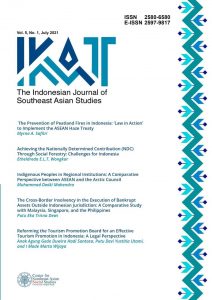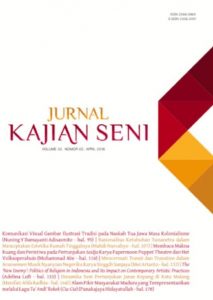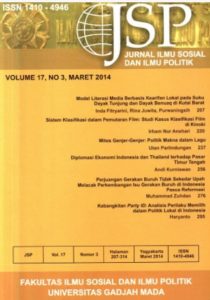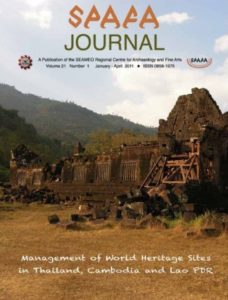Selected papers will be published in one of the followings:
IKAT: The Indonesian Journal of Southeast Asian Studies
 IKAT: The Indonesian Journal of Southeast Asian Studies ISSN 2580-6580 (Print) 2597-9817 (Online) is an academic, open access, and double-blind reviewed journal about Southeast Asian societies and cultures. Founded in 2017 at the Center for Southeast Asian Social Studies (CESASS) Universitas Gadjah Mada, Yogyakarta, Indonesia.
IKAT: The Indonesian Journal of Southeast Asian Studies ISSN 2580-6580 (Print) 2597-9817 (Online) is an academic, open access, and double-blind reviewed journal about Southeast Asian societies and cultures. Founded in 2017 at the Center for Southeast Asian Social Studies (CESASS) Universitas Gadjah Mada, Yogyakarta, Indonesia.
The Journal strives to provide new, rigorous and comprehensive knowledge and understanding of Southeast Asia through inter-disciplinary perspectives. Its scopes include but is not limited to economic welfare, institutional knowledge production, history, political transformations and the social development of information and communication technology in the region. Contributors may focus on an in-depth individual country analysis or on comparing a multi-country case study. Given the mission statement of CESASS, contributors are encouraged to submit empirical, methodological, theoretical, or conceptual articles about Southeast Asia through the eye of social sciences.
Issues are published biannually (in January and July). Submissions are open year-around and before submitting please ensure that the manuscripts fit within IKAT’s focus and scope, and is written in English and follows our author guidelines.
Jurnal Kajian Seni
 Journal Kajian Seni is the journal from Performing Arts and Visual Arts Studies, Graduate School, Universitas Gadjah Mada. Journal Kajian Seni was established in November 2014 and has been accredited Sinta 4 by Directorate General of Higher Education, Indonesian Ministry of Education with printed version of ISSN 2356-296X and the online version of ISSN: 2356-3001. We are an academic journal that examines performing arts and visual arts with approaches and perspectives. Our focus and scope are:
Journal Kajian Seni is the journal from Performing Arts and Visual Arts Studies, Graduate School, Universitas Gadjah Mada. Journal Kajian Seni was established in November 2014 and has been accredited Sinta 4 by Directorate General of Higher Education, Indonesian Ministry of Education with printed version of ISSN 2356-296X and the online version of ISSN: 2356-3001. We are an academic journal that examines performing arts and visual arts with approaches and perspectives. Our focus and scope are:
- Performing Arts: Dance, Music, Ethnomusicology, Karawitan, Theatre, Puppet theatre, Performance Art, Television studies, film studies.
- Visual Arts: Visual Art, Plastic Art, Design, Installation, performance art.
Then, for those of you, who research about arts with interdisciplinary and perspectives analysis, such as anthropology, history, archeology, cultural studies, philosophy, textual, contextual, social science, media science, and another social approach, we are are going to wait for your article. Our journal is published twice a year, November and April.
Jurnal Ilmu Sosial dan Ilmu Politik
 Jurnal Ilmu Sosial dan Ilmu Politik (JSP) is an open access, and peer-reviewed journal. Our main goal is to disseminate current and original articles from researchers and practitioners on various contemporary social and political issues: gender politics and identity, digital society and disruption, civil society movement, community welfare, social development, citizenship and public management, public policy innovation, international politics & security, media, information & literacy, politics, governance & democracy, radicalism and terrorism. JSP is published three times a year. It is nationally accredited by the Ministry of Research, Technology and Higher Education of the Republic of Indonesia (RISTEKDIKTI), No. 30/E/KPT/2019 (November 11, 2019). Since 2017, all articles have been published in English. Submissions are open year-round.
Jurnal Ilmu Sosial dan Ilmu Politik (JSP) is an open access, and peer-reviewed journal. Our main goal is to disseminate current and original articles from researchers and practitioners on various contemporary social and political issues: gender politics and identity, digital society and disruption, civil society movement, community welfare, social development, citizenship and public management, public policy innovation, international politics & security, media, information & literacy, politics, governance & democracy, radicalism and terrorism. JSP is published three times a year. It is nationally accredited by the Ministry of Research, Technology and Higher Education of the Republic of Indonesia (RISTEKDIKTI), No. 30/E/KPT/2019 (November 11, 2019). Since 2017, all articles have been published in English. Submissions are open year-round.
SPAFA Journal
 The SPAFA Journal is an Open Access journal that publishes research and multimedia submissions in the areas of archaeology, visual arts, performing arts and cultural heritage pertinent to Southeast Asia. It is a continuation of previous print publications. The journal is published by the SEAMEO Regional Centre for Archaeology and Fine Arts (SPAFA) as part of its mission to promote professional competence, awareness and preservation of cultural heritage in the fields of archaeology and fine arts in Southeast Asia. SPAFA is a regional centre constituted in 1985 from the SEAMEO Project in Archaeology and Fine Arts, and is under the aegis of the Southeast Asian Ministers of Education Organization (SEAMOE).
The SPAFA Journal is an Open Access journal that publishes research and multimedia submissions in the areas of archaeology, visual arts, performing arts and cultural heritage pertinent to Southeast Asia. It is a continuation of previous print publications. The journal is published by the SEAMEO Regional Centre for Archaeology and Fine Arts (SPAFA) as part of its mission to promote professional competence, awareness and preservation of cultural heritage in the fields of archaeology and fine arts in Southeast Asia. SPAFA is a regional centre constituted in 1985 from the SEAMEO Project in Archaeology and Fine Arts, and is under the aegis of the Southeast Asian Ministers of Education Organization (SEAMOE).
